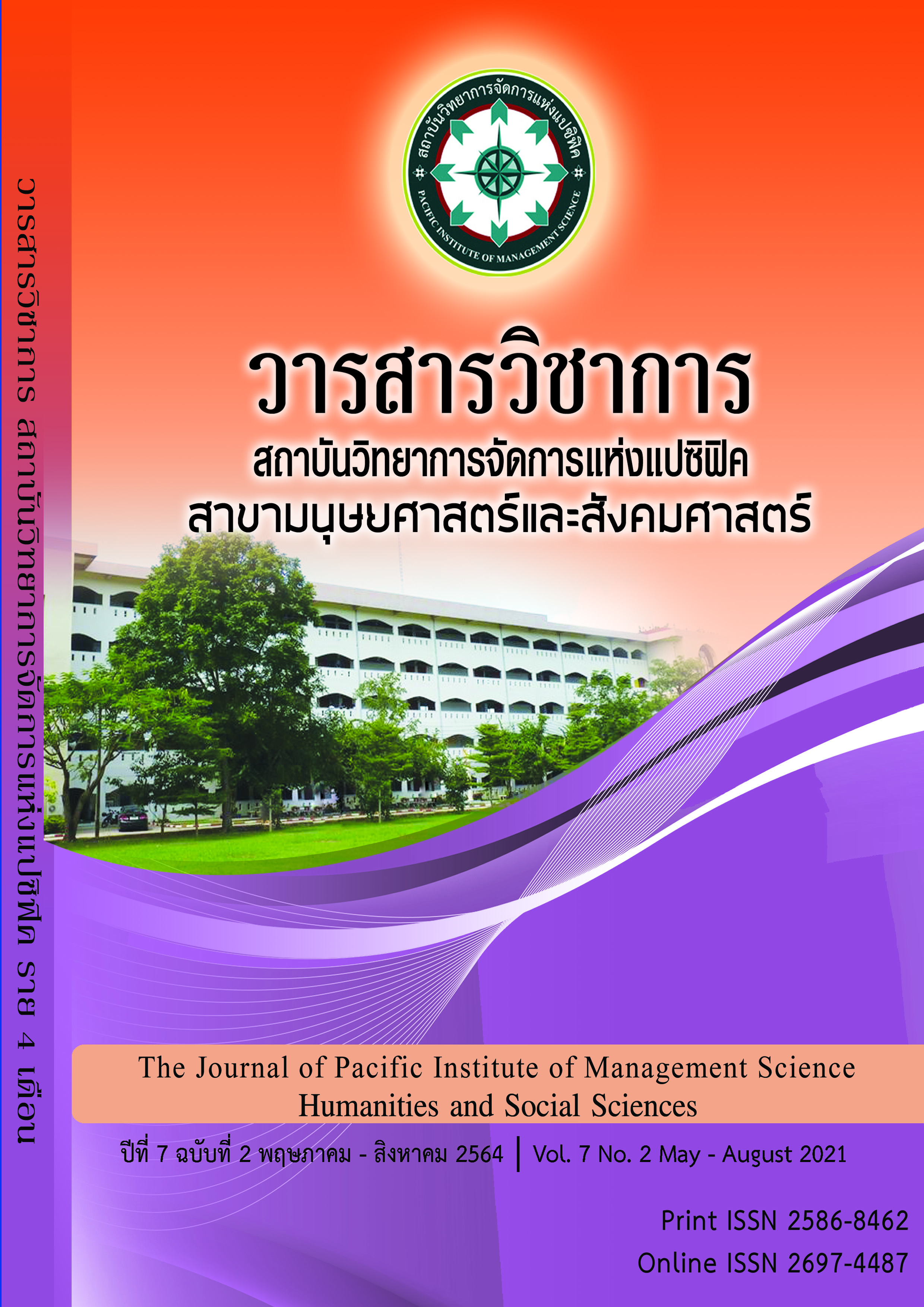Motivation and Business Strategies: Success Story from Steel and Building Materials Entrepreneur
Keywords:
Entrepreneur, Steel and Building Materials Business, Narrative ResearchAbstract
The objectives of this research were 1) to study the motivation of successful steel and building materials entrepreneur and 2) to find the strategies for the successful of the steel and building materials business. The researcher used qualitative research, according to narrative research approach. Data were gathered through in-depth interviews; the key informant was Mr. Trong Sriworawet, together with non-participant observation, and documents study. Data were analyzed by content analysis. The results found that the motivation for doing business in steel and construction materials were those of the need for life security, the motivation based on the expectations of others, and the motivation to added benefit for society. Strategies for successful entrepreneurship in steel and building materials business include risk management strategies, marketing strategy, and human resource strategies.
References
กรมพัฒนาธุรกิจการค้า. (2562). ประมวลและวิเคราะห์ข้อมูลธุรกิจขายวัสดุก่อสร้าง.
สืบค้าเมื่อ 24 กันยายน 2563 จาก ttps://www.dbd.go.th/download/document_file/Statisic/
/T26/T26_201907.pdf
จิระพงค์ เรืองกุน. (2562). การออกแบบการวิจัย: แนวทางการวิจัยเชิงปริมาณ เชิง คุณภาพ และผสานวิธี. นนทบุรี: เนชั่นไฮย์ 1954.
ชนิศา มณีรัตนรุ่งโรจน์. (2557). การปรับตัวของธุรกิจครอบครัวค้าปลีกวัสดุก่อสร้างใน จังหวัดนครราชสีมา.วารสารเทคโนโลยีสุรนารี Suranaree Journal of Social Science. 8(2), 71-85.
ธชิษา ศรีจอมทอง อรพิณ สันติธีรากุล และเขมกร ไชยประสิทธิ์. (2562). ปัจจัยแรงจูงใจที่ มีผลต่อการตัดสินใจเริ่มต้นธุรกิจสตาร์ตอัพของผู้ประกอบการในจังหวัด เชียงใหม่. วารสารปัญญาภิวัฒน์. 11(3), 15-29.
ปณิธิ คูตระกูล ศรัญญา รักสงฆ์ และอัจฉรียา อิสระไพบูลย์. (2561). ความสัมพันธ์ ระหว่าง ประสิทธิผลช่องทางการตลาดกับผลการดำเนินงานของธุรกิจจำหน่าย วัสดุก่อสร้างในภาคตะวันออกเฉียงเหนือ. วารสารมหาวิทยาลัยราชภัฏรอยเอ็ด. 12(2), 121-133.
พิมพ์ลิขิต ทองรอด. (2555). การบริหารทรัพยากรมนุษย์เชิงสร้างสรรค์: กรณีศึกษาบริษัท อินเด็กซ์ครีเอทีฟวิลเลจ. วารสารรัฐศาสตร์และนิติศาสตร์ มหาวิทยาลัยราชภัฏ กาฬสินธุ์. 1(2), 63-102.
วิจัยกรุงศรี. (2562). แนวโน้มธุรกิจ/อุตสาหกรรมปี 2562-64: ธุรกิจวัสดุก่อสร้าง. สืบค้น เมื่อ 24 กันยายน 2563 จาก https://www.krungsri.com/bank/getmedia/dfd2db4c-fd30-4be1-9840-
d908cda2/IO_Construction_Materials_190531_TH_EX.aspx
ศูนย์วิจัยกสิกรไทย. (2559). ธุรกิจค้าวัสดุก่อสร้าง ปรับกลยุทธ์รุกและรับฝ่าเศรษฐกิจ. สืบค้นเมื่อ 24 กันยายน 2563 จาก ttps://www.kasikornbank.com/th/business/sme/KSME
Knowledge/article/KSME/AnalysisDocument/ConstructionMaterialStrat egy.pdf
สราลี ตังตระกูลไพศาล และจินตนา สมสวัสดิ์. (2558). การวางแผนกลยุทธ์ทางการตลาด เพื่อพัฒนาธุรกิจร้านค้าวัสดุก่อสร้าง กรณีศึกษา หจก. ส. เจริญไพศาลโลหะ จังหวัดหนองคาย. วารสารวิทยาลัยบัณฑิตศึกษาการจัดการ หาวิทยาลัย ขอนแก่น. 8(1), 135-150.
สานิตย์ หนูนิล. 2561. การสร้างความผูกพันกับผู้มีส่วนได้ส่วนเสีย: ปัจจัยสู่ ความสำเร็จในการรับผิดชอบต่อสังคมขององค์กร. วารสารนักบริหาร. 38(1), 37-45.
Creswell, J. W. 2018. Research Design: Qualitative, Quantitative, and Mixed Methods Approaches. (5th ed.). Los Angeles: SAGE.
Doanh, D. C. & Bernat, T. (2019). Entrepreneurial Self-Efficacy and Intention among Vietnamese Students: A Meta-Analytic Path Analysis Based on the Theory of Planned Behavior. Procedia Computer Science. 159, 2447-2460.
Eriksson, P. & Kovalainen, A. (2016). Qualitative Methods in Business Research. (2nd ed.). Los Angeles: SAGE.
Liu, Y. (2020). The Micro-Foundation of Global Business Incubation: Stakeholder Engagement and Strategic Entrepreneurial Partnerships. Technological Forecasting and Social Change.
, 1-10
McClelland, D. C. (1987). Human Motivation. New York: Cambridge University Press.
Reeder, W. (1971). Partial Theories from the 25 Years Research Program on Directive Factors in Believer and Social Action. New York: Wiley.
Yang, J. (2013). The Theory of Planned Behavior and Prediction of Entrepreneurial Intention among Chinese Undergraduates. Social Behavior and Personality: An International Journal. 41(3), 367-376.
Downloads
Published
Issue
Section
License
Copyright (c) 2021 Pacific Institute of Management Science

This work is licensed under a Creative Commons Attribution-NonCommercial-NoDerivatives 4.0 International License.
บทความที่ได้รับการตีพิมพ์เป็นลิขสิทธิ์ของ สถาบันวิทยาการจัดการแห่งแปซิฟิค
ข้อความที่ปรากฏในบทความแต่ละเรื่องในวารสารวิชาการเล่มนี้เป็นความคิดเห็นส่วนตัวของผู้เขียนแต่ละท่านไม่เกี่ยวข้องกับสถาบันวิทยาการจัดการแห่งแปซิฟิค และคณาจารย์ท่านอื่นๆในสถาบันฯ แต่อย่างใด ความรับผิดชอบองค์ประกอบทั้งหมดของบทความแต่ละเรื่องเป็นของผู้เขียนแต่ละท่าน หากมีความผิดพลาดใดๆ ผู้เขียนแต่ละท่านจะรับผิดชอบบทความของตนเองแต่ผู้เดียว







